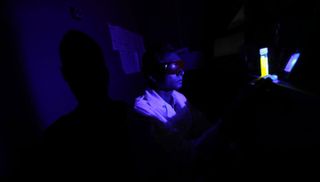Researchers discover how blue light from displays accelerates blindness
It's long been known that blue light is harmful to vision and a new study explains exactly why.

Blue light filters are popular on PC monitors and other displays as a way of preventing eye fatigue and reducing the risk of vision loss. Why exactly blue light is so harmful, however, apparently needed further research. A new study conducted by the optical chemistry research division at The University of Toledo sheds light on the situation.
The study, which was published in the journal Scientific Reports, explains that blue light exposure can actually poison eyeballs. In order to see, you need a continuous supply of retinal molecules, otherwise your photoreceptors are essentially useless. Blue light exposure causes retinal to trigger reactions that generate poisonous chemical molecules in those all-important photoreceptor cells.
"It's toxic. If you shine blue light on retinal, the retinal kills photoreceptor cells as the signaling molecule on the membrane dissolves," Kasun Ratnayake, a PhD student researcher who contributed to the study, stated in a press release. "Photoreceptor cells do not regenerate in the eye. When they're dead, they're dead for good."
The death of photoreceptor cells is what's known as macular degeneration. Typically this happens with age, with more than two million new cases of age-related macular degeneration reported each year in the United States.
To study the effects of blue light, the researchers introduced retinal molecules to other cell types found in the body, including cancer cells, heart cells, and neurons. The cells died when exposed to a combination of blue light and retinal, but there was no effect when only introducing one or the other.
The good news in all this is that the research could lead to ways of preventing or treating the blue light's effects.
"We are being exposed to blue light continuously, and the eye's cornea and lens cannot block or reflect it," Dr. Ajith Karunarathne, assistant professor in the UT Department of Chemistry and Biochemistry, said. "It's no secret that blue light harms our vision by damaging the eye's retina. Our experiments explain how this happens, and we hope this leads to therapies that slow macular degeneration, such as a new kind of eye drop."
The biggest gaming news, reviews and hardware deals
Keep up to date with the most important stories and the best deals, as picked by the PC Gamer team.
Unfortunately, avoiding blue light altogether is rather difficult. It emanates from PC monitors, cell phones, and other digital devices, and also from the sun. Dr. Karunarathne recommends wearing sunglasses that can filter blue light (and UV) when outside, and also avoiding staring at electronic screens in the dark.
As we have covered in the past, there are special glasses you can buy to filter artificial blue light. We also recommend installing f.lux, which makes the color of your monitor adapt to the time of day.
Paul has been playing PC games and raking his knuckles on computer hardware since the Commodore 64. He does not have any tattoos, but thinks it would be cool to get one that reads LOAD"*",8,1. In his off time, he rides motorcycles and wrestles alligators (only one of those is true).
Most Popular






